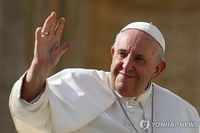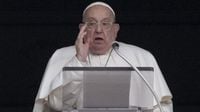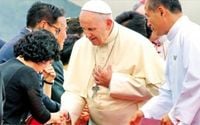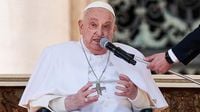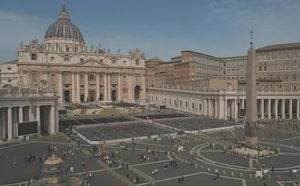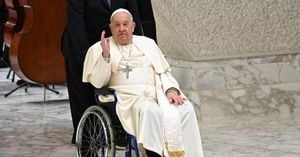Pope Francis, who led 1.4 billion Catholics worldwide for 12 years, passed away at the age of 88 on April 21, 2025. Cardinal Kevin Farrell, head of the Vatican's Secretariat for the Economy, announced that Pope Francis "returned to the house of the Father" at 7:35 AM local time. Farrell remarked that Pope Francis dedicated his entire life to serving God and the Church.
Recently, Pope Francis had been hospitalized due to a severe flu but had recovered and resumed his activities at the Vatican. Just a day before his passing, on Easter Sunday, he met with believers gathered in St. Peter's Square and delivered an Easter message, showcasing his commitment to his flock even in his final days.
Born Jorge Mario Bergoglio on December 17, 1936, in Buenos Aires, Argentina, Pope Francis grew up in a family of Italian immigrants. He entered the Society of Jesus in 1958, where he studied philosophy at San Miguel San Jose University and was ordained as a priest in 1969. His rise through the ranks was marked by significant achievements; he became the Archbishop of Buenos Aires in 1998 and was appointed as a cardinal in 2001.
In March 2013, following the resignation of Pope Benedict XVI due to health issues, Francis was elected as the 266th Pope, becoming the first Jesuit and the first from the Americas to hold the position. His papacy was characterized by a focus on humility and inclusion, earning him the title "Apostle of Inclusion."
Pope Francis was known for breaking with tradition in various ways. For instance, during his first Maundy Thursday as Pope in 2013, he washed the feet of 12 inmates at a juvenile detention center near Rome, including women and Muslims. This act defied the traditional practice of washing only the feet of Catholic men.
His progressive stances on social issues drew both praise and criticism. He openly supported the blessing of same-sex couples, stating, "If a homosexual person is of good will and is in search of God, who am I to judge?" This perspective clashed with traditional Catholic teachings and drew ire from conservative factions within the Church.
In addition to his progressive views on LGBTQ+ rights, Pope Francis made strides in addressing other social issues. He was vocal about the plight of the poor and marginalized, urging compassion and understanding from his followers. His visit to South Korea in August 2014, shortly after the tragic Sewol ferry disaster, exemplified this commitment. During his visit, he met with victims' families and expressed his deep condolences, stating that the tragedy united all Koreans in sorrow.
Pope Francis also made significant contributions to global peace efforts. He played a crucial role in the normalization of relations between the United States and Cuba in 2015, facilitating dialogue between the two nations that had been at odds for decades. In 2017, he visited Myanmar to address the plight of the Rohingya people, who faced severe persecution, and he consistently called for peace in conflict-ridden areas, including his appeals regarding the violence in Ukraine and the ongoing conflict between Israel and Hamas.
His commitment to environmental issues was evident in his 2015 encyclical "Laudato Si'," which addressed climate change and the moral imperative to care for our planet. He often criticized consumerism and urged people to live more simply and sustainably.
Pope Francis's health had been a concern in recent months. He was hospitalized in early February 2025 for a lung condition and was readmitted on February 14. Although he initially showed signs of recovery, his health deteriorated leading up to his death.
In his lifetime, Pope Francis expressed a desire for simplicity, both in his personal life and in Church rituals. He often emphasized the importance of humility and service, stating, "To learn how to live, you must learn how to love. Through love, we can break down the great barriers that divide us and overcome conflict, indifference, and hatred." His funeral is expected to reflect his wishes for a simple and dignified ceremony.
As the world mourns the loss of Pope Francis, his legacy as a champion of the marginalized, a voice for peace, and a proponent of inclusion will continue to resonate. His commitment to social justice and environmental stewardship has left an indelible mark on the Catholic Church and the global community.
With his passing, many are left reflecting on the profound impact he had during his papacy, not only within the Church but also in broader societal issues. His progressive views, compassionate outreach, and unwavering dedication to the teachings of Christ have inspired countless individuals around the world.
![[속보] '빈자들의 교황' 프란치스코 선종 | 중앙일보](https://thumbor.evrimagaci.org/Uz1Zwp7np-Nm2Vn58vT2bRHL0LE=/200x0/tpg%2Fsources%2F26578d2a-1cb6-43de-a0e8-2a3cacade32e.jpeg)
